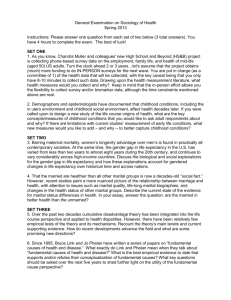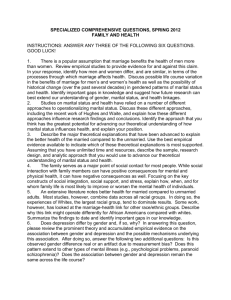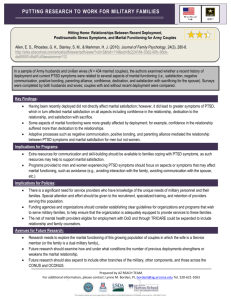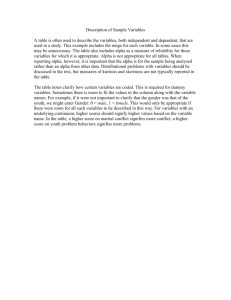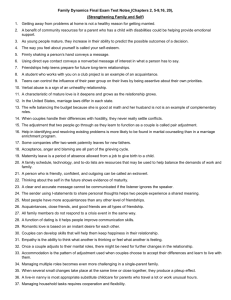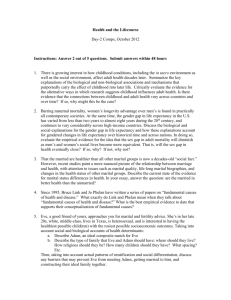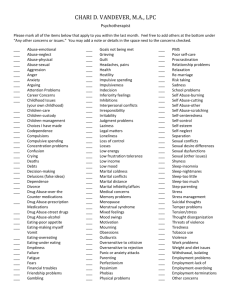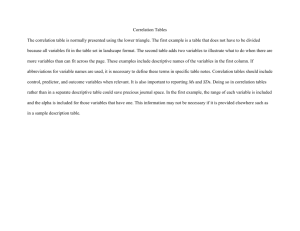article - Journal of Emerging Trends in Educational
advertisement
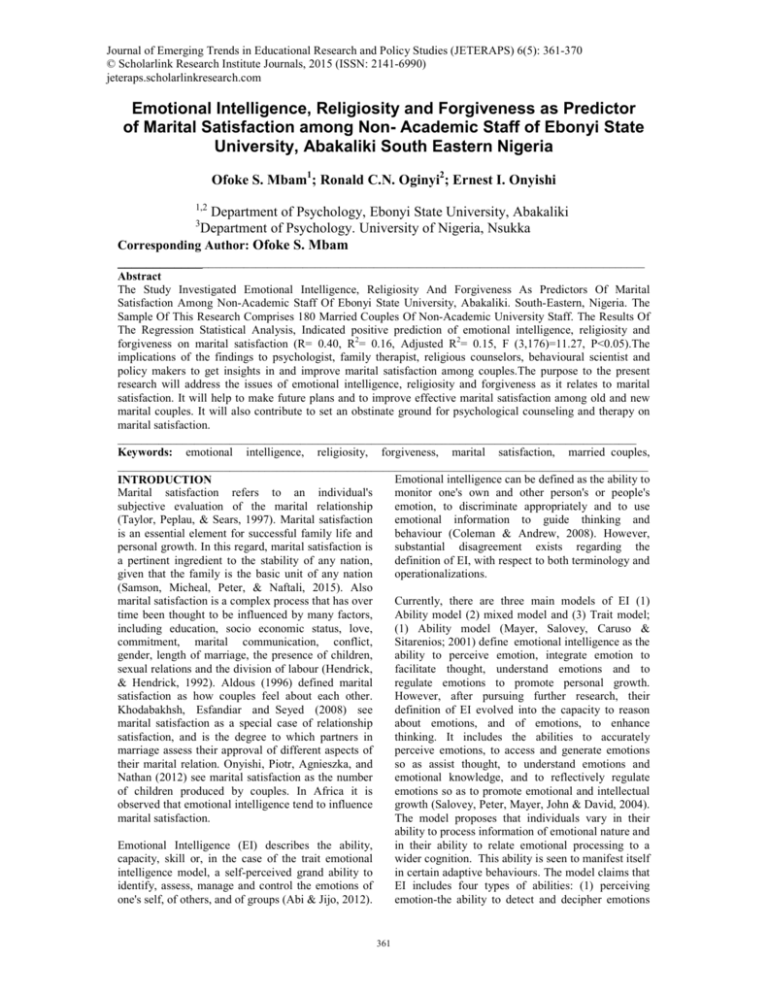
Journal of Emerging Trends in Educational Research and Policy Studies (JETERAPS) 6(5): 361-370 Journal of Emerging Trends in Educational Research and2141-6990) Policy Studies (JETERAPS) 6(5):361-370 (ISSN:2141-6990) © Scholarlink Research Institute Journals, 2015 (ISSN: jeteraps.scholarlinkresearch.com Emotional Intelligence, Religiosity and Forgiveness as Predictor of Marital Satisfaction among Non- Academic Staff of Ebonyi State University, Abakaliki South Eastern Nigeria Ofoke S. Mbam1; Ronald C.N. Oginyi2; Ernest I. Onyishi 1,2 Department of Psychology, Ebonyi State University, Abakaliki Department of Psychology. University of Nigeria, Nsukka Corresponding Author: Ofoke S. Mbam _______________________________________________________________________________________ 3 Abstract The Study Investigated Emotional Intelligence, Religiosity And Forgiveness As Predictors Of Marital Satisfaction Among Non-Academic Staff Of Ebonyi State University, Abakaliki. South-Eastern, Nigeria. The Sample Of This Research Comprises 180 Married Couples Of Non-Academic University Staff. The Results Of The Regression Statistical Analysis, Indicated positive prediction of emotional intelligence, religiosity and forgiveness on marital satisfaction (R= 0.40, R2= 0.16, Adjusted R2= 0.15, F (3,176)=11.27, P<0.05).The implications of the findings to psychologist, family therapist, religious counselors, behavioural scientist and policy makers to get insights in and improve marital satisfaction among couples.The purpose to the present research will address the issues of emotional intelligence, religiosity and forgiveness as it relates to marital satisfaction. It will help to make future plans and to improve effective marital satisfaction among old and new marital couples. It will also contribute to set an obstinate ground for psychological counseling and therapy on marital satisfaction. ________________________________________________________________________________________ Keywords: emotional intelligence, religiosity, forgiveness, marital satisfaction, married couples, __________________________________________________________________________________________ Emotional intelligence can be defined as the ability to INTRODUCTION Marital satisfaction refers to an individual's monitor one's own and other person's or people's subjective evaluation of the marital relationship emotion, to discriminate appropriately and to use (Taylor, Peplau, & Sears, 1997). Marital satisfaction emotional information to guide thinking and is an essential element for successful family life and behaviour (Coleman & Andrew, 2008). However, personal growth. In this regard, marital satisfaction is substantial disagreement exists regarding the a pertinent ingredient to the stability of any nation, definition of EI, with respect to both terminology and given that the family is the basic unit of any nation operationalizations. (Samson, Micheal, Peter, & Naftali, 2015). Also marital satisfaction is a complex process that has over Currently, there are three main models of EI (1) time been thought to be influenced by many factors, Ability model (2) mixed model and (3) Trait model; including education, socio economic status, love, (1) Ability model (Mayer, Salovey, Caruso & commitment, marital communication, conflict, Sitarenios; 2001) define emotional intelligence as the gender, length of marriage, the presence of children, ability to perceive emotion, integrate emotion to sexual relations and the division of labour (Hendrick, facilitate thought, understand emotions and to & Hendrick, 1992). Aldous (1996) defined marital regulate emotions to promote personal growth. satisfaction as how couples feel about each other. However, after pursuing further research, their Khodabakhsh, Esfandiar and Seyed (2008) see definition of EI evolved into the capacity to reason marital satisfaction as a special case of relationship about emotions, and of emotions, to enhance satisfaction, and is the degree to which partners in thinking. It includes the abilities to accurately marriage assess their approval of different aspects of perceive emotions, to access and generate emotions their marital relation. Onyishi, Piotr, Agnieszka, and so as assist thought, to understand emotions and Nathan (2012) see marital satisfaction as the number emotional knowledge, and to reflectively regulate of children produced by couples. In Africa it is emotions so as to promote emotional and intellectual observed that emotional intelligence tend to influence growth (Salovey, Peter, Mayer, John & David, 2004). marital satisfaction. The model proposes that individuals vary in their ability to process information of emotional nature and Emotional Intelligence (EI) describes the ability, in their ability to relate emotional processing to a capacity, skill or, in the case of the trait emotional wider cognition. This ability is seen to manifest itself intelligence model, a self-perceived grand ability to in certain adaptive behaviours. The model claims that identify, assess, manage and control the emotions of EI includes four types of abilities: (1) perceiving one's self, of others, and of groups (Abi & Jijo, 2012). emotion-the ability to detect and decipher emotions 361 Journal of Emerging Trends in Educational Research and Policy Studies (JETERAPS) 6(5):361-370 (ISSN:2141-6990) in faces, pictures, voices, and cultural artifacts, also include the ability to identify one's own emotions (ii) using emotions. The ability to harness emotions to facilitate various cognitive activities such as thinking and problem solving (iii) understanding emotions- the ability to comprehend emotion language and to appreciate complicated relationships among emotions. For example, understanding emotions encompasses the ability to be sensitive to slight variations between emotions, and the ability to recognize and describe how emotions evolve over time (iv) managing emotions-the ability to regulate emotions in both ourselves and in others. The emotionally intelligent person can harness emotions, even negative ones, and manage them to achieve intended goals. (2) Mixed model (goleman, 1998) view emotional intelligence as a wide array of competencies and skills that drive leadership performance. The model outlines fire main EI constructs as to include (1) self-awareness-the ability to known one's emotions, strengths, weaknesses, drives, values and goals and recognize their impact on others while using gut feeting to guide decisions (ii) self-regulations-inclives controlling or redirecting one's disruptive emotions and impulses and adapting to changing circumstances (iii) social skill-managing relationship to move people in the desired direction (iv) Empathy-considering other people's feeling especially when making decision. (v) motivationbeing driven to achieve for the sale of achievement. (3) Trait model (Petrides & Furnham 2000) trait model of emotional intelligence refers to an individual's self-perceptions of their emotional abilities. This definition of EI encompasses behavioural dispositions and self-perceived abilities. Bar-on (1997) defines emotional intelligence as effectively understanding oneself and others, relating well to people, and adapting to the immediate surroundings. Toga &Thompson (2005) defined emotional intelligence as the tendency to abandon negative emotions, thoughts and behaviours towards a transgressor and transforming them into more positive emotions, thoughts and behaviours. According to Petrides & Furnham (2001). Emotional intelligence factors include flexibility, assertiveness, awareness, expression, management and control of emotions, self-esteem, low impulsiveness, communication skills, selfmotivation, stress management, social competence, trait empathy, trait happiness and trait optimism. 150 subjects from physical disabled selected using purposive sampling method and they were matched based on type and degree of disabilities and age. Result indicated that there was a significant difference between marital satisfaction, emotional intelligence, religious beliefs, and problem-centered coping strategies scores of the two groups. The correlation between the predictor variables (emotional intelligence, religious beliefs, problemcentered coping strategy and emotion-focused coping strategy was 0.91 with marital satisfaction. These variables predicted 82% of marital satisfaction significantly (P<0.001). Agha, Mokharee, Sayadi, Nazer, & Mosavi, (2012) investigated the study of emotional intelligence and marital satisfaction in academic member sofa Refsanjan university of medical sciences. Using 120 participants selected through purpose sampling techniques. The result revealed that all the variable of emotional intelligence and marital satisfaction had a significant meaningful relationship. 37% of marital satisfaction is predictable by emotional intelligence. Grieco (2001) examined emotional intelligence, levels of commitment, and network of social support as predictors of marital satisfaction. The result figured out that in the first marriage there is a dependency and a correlation between the dimensions of emotional intelligence and satisfaction. Inter and intrapersonal communications, adaption, stress management, and the general temper are meaningfully predictors of marital satisfactions especially in the components of emotional intelligence. But among the many different components of emotional intelligence, only about the general temper, sub-scales of happiness, optimism, general feeling of satisfaction and life perspectives is predictors of meaningful quantity of variance in marital satisfaction. He add that the link between emotional intelligence and marital satisfaction may be of a reciprocal nature, and marital satisfaction may inculcate a sense of happiness and optimism in an individuals. Furthermore, happiness and satisfaction may be conditions to increase the sense of satisfaction. Roya, Noorain, Azlina & Afsaneh (2011) investigated the relation between emotional intelligence and forgiveness with marital satisfaction. Using 200 Iranian married couples whom were randomly selected. The result shows that there are significant relation between emotional intelligence and marital satisfaction as well as significant relation between forgiveness sand marital satisfactions. Zohr, Sayed & Hojaollah (2014) defined emotional intelligence as the set of skills that allow us to use motions to adapt, in other words, to perceive, understand and regulate our moods and use emotional information to improve cognitive resources. Behnammoghadam, Hashem, Biram & Yarian (2014) examined the relationship of marital satisfaction and religious beliefs, emotional intelligence and coping strategies in veteranus and physical Handicaps. Using Fitness (2001) pointed out that emotion perception, understanding and reasoning about emotion and regulating or managing emotions are important in marriage. However, fitness further suggests that the link between marital happiness and these aspects of emotional intelligence may not always be related. In 362 Journal of Emerging Trends in Educational Research and Policy Studies (JETERAPS) 6(5):361-370 (ISSN:2141-6990) another study, married couples with higher selfreported emotional intelligence reported higher marital satisfaction (Schutte, Malouff, Bobik, Coston, Greeson, Jedicka, Rhodes, & Wendorf, 2001). religiosity as numerous aspects of religions activity, dedication, and belief (religious doctrine). One of the significant determinants of marital satisfaction seems to be the religiosity (Khodabakhsh, et al, 2008; Petrut, Paraschiva & Maria-Nicoleta, 2011; Muhammad, 2012; Holdcroft, 2006; Bergan, & McConatha, 2009). Panagiota, Micheal, Adamantios and Vansteen Wegen (2006) investigated the association between religiosity and marital satisfaction among first-married and remarried adults. Results showed that religiosity had a significant positive correlation with sexual-satisfaction problems and marital instability. Khodakhs, et al (2008) investigated the influence of religiosity on marital satisfaction among 660 hetero sexually heterosexually couples from Tehran, using cluster sampling. The results showed that heterosexually couples who observe religious beliefs have higher rate of marital satisfaction. Also there is a significant correlation between religiosity and marital satisfaction. Thus, with the increase in religiosity, material satisfaction rate will increase and vice versa. Zohr, Sayed & Hojatollah (2014) investigated the relationship between emotional intelligence and marital satisfaction: 10 year outcome of partner from three different economic levels. Using 159 couples whom were selected through clustered sampling techniques. Result shows that emotional intelligence value (M=333.1) and marital satisfaction (M=3000.77) were high in the under-rich region (P<0.05).Also, there was no significant relationship between interpersonal and marital satisfaction within the under-rich region. On average, emotional intelligence accounted for 40.8% of marital satisfaction within those three regions (P<0.01). some studies showed a strong correlation between the couples' emotional intelligence and marital satisfaction (Najm, 2005; Fabien, 2014; Tirgari, Asgharnezhad, Bayanzadeh, & Abedin, 2006; Soleymani & Mohammadi, 2009; Lavaleka, Kulkarni & Jagtap, 2010; Ratra & Kaur, 2004). Marital satisfaction is related to religiosity in the fact that every couples tends to use religiosity as a tools for marital satisfaction and stability in our African context today. Since religion and the family foundations emphasis on the same values and related to strengthening socialization, stabilization and harmonization within and outside marital relationship. This assumption brought the idea that the religion can fortify, stabilize and support the couple's relationship or marital satisfaction (Call & Heaton, 1997; Mohammad, Rouhoollah, & Sueid, 2013). The religion can affect marital relations, because it has effective guidance to life improvement and effective system of beliefs and values to life reinforcement (Hunler, & Genchuz, 2005). Rayya and Motkal (2007) examine acculturation, Christian religiosity, marital satisfaction and psychological well-being among the European wives of Arabs in Isreal. The result revealed that Christian religiosity of the wives was positively statistically significantly related to self-esteem and positive affect and negatively correlated with negative effect, marital satisfaction and marital intimacy. Mohammad, et al (2013) investigated the relationship between religiosity and marital satisfaction among married students of university of Tehran. Using 56 married students', results revealed that there is a significant positive relation between religious attitude and marital satisfaction. Results also indicated that religious attitude had a more significant relation with dyadic consensus than other three dyadic adjustment scale. Results reveal no significant differences between marital satisfaction and religiosity among married male and female students. Sullivan (2001) reported that people who are in higher level of religiosity are more stable in their marriage and have a higher satisfaction compared to the people who are in lower level of religiosity. Several studies (Mahoni, 2005; Russ, Westfield, & Ansli, 2001; Petterson et al 2000) on religiosity and marital satisfaction showed that religiosity had a significant positive effect on marital satisfaction. In Africa context, many believe that when marriage are accompanied with religiosity, it increases couples responsibility to be kind, supporting life calmness, faithfulness, forgiveness, understanding and commitment of spouse which have implications to the marital satisfaction and relationship of couples (Mahoney, 2005). Matthews (1996) religion is an organized system of beliefs, practices and symbols, designed to enable closeness to God. Levin & Shciller (1987) defined religiousness as the degree of one's involvement and personal significance attached to such a system (Baldachino, 2003; Nonnemaker, Mc.Neclyb, & Blum, 2003). One of the most important variables that seem to correlate with marital satisfaction in our global world today is forgiveness. Forgiveness is the process sparing fault and easing its consequences that individual perform it with the purpose of achieving internal calmness for self, improving family relations, and freeing himself from hate, and reach the following consequences; (i) freedom from negative Muhammad (2012) defines religiosity as the state of one's belief in God, characterized by his piety and religious zeal. The higher his piety and religious zeal are, hence the stronger his/her belief in God, the higher his/her religiosity is. Kucukcan (2010) see 363 Journal of Emerging Trends in Educational Research and Policy Studies (JETERAPS) 6(5):361-370 (ISSN:2141-6990) feeling towards wrong doing person (ii) erasing the effects of hurt (iii) Avoiding anger, separation, and retaliation and other hostile behaviours towards wrong doer (Bagher, Fatimah, Akram & Fatemeh, 2014). Jose and Alfons (2006) examined the effect of forgiveness on marital satisfaction in relation to marital stability among first-married and remarried adults. Using 787 Flanders regions in Belgium. The result showed that in the overall forgiveness, there was no significant difference between the firstmarried and remarried, the first-married significantly differed in two subscales of Enright forgiveness inventory (EFI) from the remarried. A significant difference in the married satisfaction was found between the first-married and remarried adults. Also there was a significant positive correlation between forgiveness and general-life adjustment. Some of the other researchers that reported on forgiveness were: within romantic relationships and marital satisfaction (Fincham, beach, & Davila, 2003; Finkel, rusbult, Kumashiro, & Hannon, 2002; Fincham et al, 2004).Since few studies have been done on the emotional intelligence, religiosity and forgiveness as predictors of marital satisfaction among nonacademic staff in a non-western society: Nigeria. The purpose of this research is to determine the contribution of emotional intelligence, religiosity and forgiveness in predicting marital satisfaction among non-academic staff of Ebonyi State University, Abakaliki married couples. In view of this, the statement to the problem is stated: Does emotional intelligence, religiosity and forgiveness have significant relation on marital satisfaction? Gordon, Hughes, Tomcit, Dixon and Litzinger (2009) and Fincham, Halland, Beach (2006) defines forgiveness into two-dimensional, including positive forgiveness in marital relationships has been defined as lower levels of blame, increased understanding of one's spouse, decreased levels of anger in regard to the betrayal, behaviours which reflect moving on from the betrayal and a sense of emotional peace experienced by the forgiver. While negative forgiveness is defined as high levels of blame, lower understanding of one's spouse. A review of current forgiveness literature reveals that most researchers and psychologist view forgiveness as adaptive (McCullough, 2000; Thompson, & Snyder, 2003; Thompson, et al; 2005). Forgiveness has been linked to psychological health and well-being in general (Enright, 2000; Scobie & Scobic, 2002; Worthington, 2002; Sandage, & Berry, 2000; Rippley & Worthington, 2002; Thompson & Snyder, 2003). The likelihood of forgiveness in intimate relationships has been found to have an influence on couple's satisfaction level (Fincham, Paleari & Regalia 2002). Also individuals who are in a long-term marriage report that willingness to forgive is an important construct that elongates and maintains marital satisfaction or relationship (Paleari, Regalia & Fincham (2005). HYPOTHESES (i) There is no significant relation between emotional intelligence and marital satisfaction among married non-academic staff. (ii) There is no significant relation between religiosity and marital satisfaction among married non-academic staff. (iii) There is no significant relation between forgiveness and marital satisfaction among married non-academic staff. Maryam and Reza (2012) investigated the relationship between forgiveness and marital satisfaction in Band-Abbas married women. Using 200 participants. Result indicated a significant positive relationship between marital satisfaction and forgiveness. Results also suggest the existence of multiple relationships between forgiveness and marital satisfaction and that forgiveness was the best predictor of marital satisfaction. METHOD Participants The participants were all Christians of Igbo ethnic group. The Igbo are located in five states in southeastern, Nigeria (Odimegu, 1998), and they are one of the largest and most influential ethnic groups in Nigeria (approximately 27 million people). They speak various Igboid dialects, with English frequently spoken as well (Fardon & Furniss, 1994). Gordon, et al (2009) found a negative relationship between negative forgiveness and marital satisfaction for both husbands and wives such that higher levels of negative forgiveness were associated with lower levels of marital satisfaction. Bagher, Fatimah, Akram and Fatemeh (2014) examined the relations between forgiveness, marital satisfaction, and mental health between mothers of children with mental retardation and mothers of non disabled children.Using 100 participants who were selected randomly. Result revealed that a significant correlation existed between symptom, checklist sub scales of SCL 90 R, forgiveness and, marital satisfaction. Data indicated that with increment of forgiveness in individuals symptoms decrease. In the present study, 160 people having a wife or husband participated. The participants were 90 men aged between 22 and 70 years (mean = SE= 5.5.10=12.1) and 70 women aged between 21 and 68 years (mean SE=40.8 = 19.1). They had between 0 and 9 children (mean= SI=4.6 = 3.1). The participants were academic staff members at the Ebonyi State University, South-Eastern, Nigeria. A large State government-owned institution. They level of 364 Journal of Emerging Trends in Educational Research and Policy Studies (JETERAPS) 6(5):361-370 (ISSN:2141-6990) education was master's degree, N=95; postgraduate degree, N=50, Professors 15. University staff earn between N110, 000,000 (about $210,00) to N500,000 (about $250) monthly. Cronbach's alpha for the entire scale of 0.87. A pilot study was carried out using 150 academic staff of federal college Ikwo. The analysis yielded cronbach´s alpha reliability of 0.86. (4) Enrich Marital Satisfaction Scale (EMS) developed by Fournier, Olson, & Druckman (1983). The EMS scale is a 15-item scale comprising the idealistic distortion and marital satisfaction scale. With a 5-point response ranging from 1=strongly disagree to 5=strongly agree. The 15 items contains statement like "our relationship is a perfect success", I am very pleased about how we express affection and relate sexually", "I feel very good about how we each practice our religious beliefs and values". The instrument had Cronbach's alpha reliability of .86. Test-retest reliability 0.85. A pilot study was carried out using 150 academic staff of federal college Ikwo. The analysis yielded cronbach´s alpha reliability of 0.89. Instruments Four instruments were used for this study are: (1) Emotional intelligence scale (EIS) developed Schutte, Malouff, Hall, haggerty, Gold and Dornhein (1998). (2) Religious affiliation scale (RAS) (Omoluabi, 1995) (3) Forgiveness scale (FS) developed by enright,1991) (4) Enrich Marital Satisfaction Scale (EMS) developed by Fournier, Olson, & Druckman (1983) (1)Emotional Intelligence Scale (EIS) developed Schutte, Malouff, Hall, haggerty, cooper, Gold and Dornhein (1998). It is a 33 item scale that measure participants emotional intelligence. It is a 4point likert scale format ranging from strongly disagree (1) to strongly agree (4). It contains statements like "I expect good things to happen", I help other people feel better when they are down", I have control over my emotion" etc. The scale has a high reliability coefficient 0.70 and with a Cronbach's alpha of 0.85. A pilot study was carried out using 150 non-academic staff of federal college Ikwo. The analysis yielded cronbach´s alpha reliability of 0.86. (2) Religious Affiliation Scale (RAS) developed by Omoluabi (1995). It is a 2-point scale consisting of a "True" and "false" response. The 21 item inventory was designed to measure the extent to which individuals engage, believe and hold strong religious activities and practices. It contains statements like "I believe in a supreme God/Allah", "I cannot marry a person who is not a member of my religious denomination", etc. The scale has a high reliability coefficient of 0.97; and a Cronbach's alpha of 0.86. (3) Forgiveness Scale (FS) developed by Enright and the human development study group (1991) and validated by Rye, 1998 and adopted by Mark, Dawn, Brandon, Todd and Benjamin (2001). It is a 5-point likert scale format ranging from strongly disagree (1) to strongly Agree (5) response. The 15 item was designed evaluate wrong doing (forgiveness). It contains statements like "I can't stop thinking about how I was wronged by this person", I feel resentful toward the person who wrong me", I have compassion for the person who wronged me" etc. The scale has a high reliability coefficient of negative and positive forgiveness of 0.86 and 0.85.With a Procedures The survey was administered individually in various offices in the Faculty of Social Sciences and Humanities Ebonyi state University, Abakaliki. South-Eastern Nigeria during the working hours by selected and trained research assistants (psychology students). Respondents were assured of the anonymity in their responses. The respondents were allowed to complete the survey at their convenience, and the research assistants would return to collect the completed questionnaire at a time agreed upon by the respondent and assistant. Out of the 170 workers surveyed initially, 160 (95.5%) completed and returned their surveys. Ten out of the 170 returned copies of the questionnaire were discarded as a result of incompletely filled, leaving 160 that were used for data analysis. All the respondents volunteered to participate, and they were not compensated for taking part in the study. Design/Statistics The design of the study was a Cross-sectional design and regression analysis was used to test the stated hypotheses. SPSS version 20 software was used for statistical analysis. RESULTS Table 1: show means and standard deviation of marital satisfaction, emotional intelligence, religiosity and forgiveness variables Table 1: Mean and Standard Deviation of Variables Variables Marital satisfaction Emotional Intelligence Religiosity Forgiveness Means 52.04 96.60 130.98 49.50 Standard deviation 9.255 10.757 10.457 8.494 Results from table 1 shows that variables of emotional intelligence had (M= 96, SD= 10.757), Note: N = 180 365 Journal of Emerging Trends in Educational Research and Policy Studies (JETERAPS) 6(5):361-370 (ISSN:2141-6990) variable religiosity had (M=130.98, SD= 10.457), forgiveness had (M= 49.80, SD= 8.494) while the dependent variable had (M= 52.04, SD= 9.255). This implies that religiosity and emotional intelligence had the largest mean and standard, deviation than the forgiveness on marital satisfaction. relationship between emotional intelligence and marital satisfaction among married couples. This present researchis supported by (Vadnais, 2005; Najm, 2005; Fabien, 2014; Tirgari, Asgharnezhad Bayanzadeh & Abedin, 2006; Soleymani & Mohammadi, 2009; Lavalekar, Kulkarni & Jagtap, 2010; Orathinkal & Vansteenwegan, 2006; McCarthy, 2006; Kriegelewicz, 2006; Nunes, 2008;Forooghi, Hoseinian, & Yazdi, 2005; Rauer & Voling ,2005; Roga, Nooraini, Azlina & Afsaneh,2011 Fitness,2001;Bricker,2005) all this studies showed that there was positive relationships between emotional intelligence and marital satisfactions. Table 2: Shows ANOVA summary on emotional intelligence, religiosity, forgiveness as predictors of marital satisfaction among non-academic staff of Ebonyi State University, Abakaliki Variable model Regression Residual Total SS df Ms F Sign 2770.141 12862.587 15332.728 3 176 179 823.380 73.083 11.266 0.000* The second hypothesis, which stated that there is no significant relationship between religiosity and marital satisfaction was rejected, due to the fact there were significant positive predictor of religiosity and marital satisfaction among married couples (β =.40, P<0.05).This result is in conformity with the findings of Margaret et al. 1990; Call & Heiton, 1997; Sulivan, 2001;Hanler & Genchuz,2005; Ortingal & Vanstiugen, 2006; (Mahoni, 2003; Mahoni,2005; Lotfabadi, 2005; Mahoni; Khodayarifard et al.,2002; Mahoni et al., 1999;Russ, Westfield, & Ansli, 2001; Ptresono et al., 2000) all these studies confirmed the positive relationship between the religiosity and marital satisfaction. a. Dependent variable: Marital satisfaction b. Predictors: (Constant), forgiveness, emotional intelligence, religiosity P<0.05; F(3, 176) = 11.266, P<.0.000* Results from table 2 showed that there was a positive significant relationship between Emotional intelligence, Religiosity and forgiveness on marital satisfaction among non-academic staff couples of Ebonyi State University, Abakaliki; F(3, 176)= 11.266, P<0.000*. Table 3: shows the regression analysis for prediction of marital satisfaction through emotional intelligence, religiosity and forgiveness variable Variable Marital satisfaction Emotional Intelligence Religiosity Forgiveness B 85.32 0.007 -0.35 0.23 B 0.000 0.008 -0.40 0.21 t 8.47 .112 -5.52 2.00 p 0.000 .911 0.000 0.003 The third hypothesis which stated that there is no significant relationship between forgiveness and marital satisfaction was rejected, because there were observed positive prediction of forgiveness on marital satisfaction (β=0.21, P<0.05). This finding was in concordance with the findings of (Enright & Fitzgibbons, 2000; Baucom, 1998; Orathinkal & Vansteenwegan (2006); Fincham at el, 2007; Gordon & Baucom, 1998) finds that forgiveness and marital satisfaction are positively correlated. SE 10.08 0.59 0.63 0.08 R= 0.40; R2= 0.16; Adjusted R2= 0.15. F (3, 176)= 11.27, P<0.05. In the variable model three of the predictor variables were statistically significant, with forgiveness recording a higher beta value (β=0.21, P<0.05) than Emotional intelligence (β =0.01, P<0.05) and Religiosity (β =.40, P<0.05). This indicated that forgiveness had the highest predictive power on marital satisfaction followed by emotional intelligence and religiosity. LIMITATIONS OF THE STUDY The present study has the following limitations: external validity and lack of generalizability. The current sample was very homogenous, with the majority of participants being highly educated and reporting significantly higher levels of marital satisfaction than the normative population. The sample is clearly not representative of the greater population and lack generalization. DISCUSSION The current study investigated emotional intelligence, religiosity, and forgiveness as predictors of marital satisfaction among married non-academic staff of Ebonyi State University; Abakaliki South-Eastern Nigeria. For this purpose three hypotheses. SUGGESTION FOR FURTHER STUDIES Considering the results of the present study and other researches in this field, the following can be suggested: Emotional intelligence, religiosity and forgiveness can be considered as one of the predictive criteria for a successful marital satisfaction of married non-academic staff. Devising an intervention program for parents to enhance their emotional intelligence, religiosity and forgiveness might The first hypothesis, which stated that there is no significant relationship between emotional intelligence and marital satisfaction among married non-academic staff (β =0.01, P<0.05) was rejected. This implies that there was significant positive 366 Journal of Emerging Trends in Educational Research and Policy Studies (JETERAPS) 6(5):361-370 (ISSN:2141-6990) increase couples marital satisfaction.Further studies should look at demographic variables such as educational background, gender socio-economic status and age since it seem to influence marital satisfaction. Bowlby, J. (1969). Attachment and vol.1. Attachment, New York: Basic Books. loss: RECOMMENDATION The researchers recommended the following: The emotional intelligence, religiosity and forgiveness should be encouraged since it leads to marital stability and marital satisfaction among married couple. Emotional intelligence, religiosity and forgiveness guides couples for rules for sexual relations, sexual roles, sanctification, and removing marital conflicts and dissatisfaction. Family problems can be soothed using intervention religious method and application of forgiveness treatment method in family therapy to enhance marital satisfaction and among married couples. Buss, D.M. (2007). La evolution del deseo. Estrategias del emparejamiento humano. (The Evolution of Desire. Strategies for Human Pairing) Alianza Editorial. Madrid, Espana. Bowlby, J. (1979). The making and breaking of affectional bonds. New York: Brunner-Routledge. Castro, L., Castro, L.C., Castro,. M.A., & Toro, M.A., (2009). Darwinismo and Ciencias Sociales: Una interpretacion evolucionista de la culture. (Darwinism and social studies: An evolutionary interpretation of culture) Ludus Vitalis, 17(32), 281306. Cawell, M. (2003). Freedom and forgiveness. International Journal of Psychoanalysis, 84(3), 515-531. REFERENCES Abdu, A. E.P. (2013). Employed women and marital satisfaction: A study among female nurses. International Journal of Management and Social Sciences Research,2(11), 17-32. Clements, M.L., Stanley, S.M., & Markman, H.J. (2004). Before they said 'I do': Discriminating among marital outcomes over 13 years. Journal of Marriage and Family, 66, 613-626. Abi, E, & Jijo, G. (2012). Emotional intelligence and job satisfaction: A correlational study. The International Journals, Research Journal of Commerce and Behavioural Sciences, 1(4), 37-42. Coleman & Andrew (2008). A dictionary of psychology (3ed.). oxford University press. Davila, J., Bradbury, T.N., Cohan, C.L., & Tochluk, S. (1997). Marital functioning and depressive symptoms: Evidence for a stress generation model. Journal of Personality and Social psychology, 73, 849-861. Agha, M.H.P, Mokhtaree, M.R., Sayadi, A.R., Nazer, M. & Mosavi, S.A. (2012). Study of emotional intelligence and marital satisfaction in academic members of Rafsnjan University of medial sciences. Journal of Psychology and Psychotherapy, 2(2), 1-5. Enright, R.D. (2000). Helping clients forgive: An empirical guide for resolving anger and restoring hope. Washington, DC: American Psychological Association. Bagher, G.B., Fatinch, N., Akram, H., & Fatemeh, B. (2014). The relations between forgiveness, marital satisfaction, and mental health between mother of children with mental retardation and mothers of non disabled children. Reef Resource Assessment and Management Technical Paper, 40(1), 42-51. Enright, R.D., & The Human Development Study Group (1991). The moral development of forgiveness. In W. Kurtines & J. Gewirtz (Eds.).Handbook of Moral Behaviour and Development 1, 123-152. Balda Chino D. (2003). Spirituality in illness and care. Preca Library: Matta varitas press. Bar-on, R. (1997). Development of the Baron EQ-i: a measure of emotional and social intelligence. Paper present at the 105th Annual convention of the American Psychological Association Chicago. Ernest, T.O., Piotr, S., Agnieszka, S., & Nathan, R.P. (2012). Children and marital satisfaction in a nonwestern sample: having more children increases marital satisfaction among the Igbo people of Nigeria. Evaluation and Human Behaviour, 33, 771774. Behnammoghadam, A., Hashem, T., Biram, M., & Yarian, S. (2014). Relationship of marriage satisfaction and religious beliefs, emotional intelligence and coping strategies in veterans and Physical handicaps. Iranian Journal of War and Public Healthy, 6(4), 131-136. Fabien, A.J. (2014). The relationship between spiritual maturity emotional intelligence, marital needs, and marital satisfaction: A correlational study among married students at ALLAS. 367 Journal of Emerging Trends in Educational Research and Policy Studies (JETERAPS) 6(5):361-370 (ISSN:2141-6990) Fincham, F.D., Beach, S.R., & Davila, J. (2004). Forgiveness and conflict resolution in marriage. Journal of Family Psychology, 18, 72-81. Hendrick, S. & Hendrick, C. (1992). Liking, loving and relating. Pacific Grove; Books/Cole. Hundson, W.W. (1982). Index of marital satisfaction. The Clinical Measurement Package: A Field Mannual. Chicago: Dorsey Press. Fincham, F.D., Hall, J., & Beach, S.R.H. (2006). Forgiveness in marriage: The role of relationship quality, attributions, and empathy. Personal relationships, 9, 27-37. Hunler, O.S., & Genchuz, T.I. (2005). The effect of religiousness on marital satisfaction: testing the mediator role of marital problem solving between religiousness and marital satisfaction. Contemporary Family Therapy, 27(1), 123-136. Fincham, F.D., Paleari, F.G., & Regalia, C. (2002). Forgiveness in marriage: The role of relationship quality attributions, and empathy. Personal Relationships, 9, 27-37. Jose, O., & Alfons, V. (2006). The effect of forgiveness on marital satisfaction in relation to marital stability. Contemporary Family Therapy, 28,251-261. Finkel, E.J., Rusbult, C. E., Kumashrio, M., & Hannon, P.A. (2002). Dealing with betrayal in close relationships: Does commitment promote forgiveness? Journal of Personality and Social Psychology, 82, 956-974. Fitness, J. (2001). Emotional intelligence an intimate relationships. Psychology Press. Kamp-Dash, C.M., & Amato, R.R. (2005). Consequence of relationship status and quality for subjective well-being. Journal of Social and Personal relationship, 22, 607-627. Foroghi A.A; Hoseinian, S. & Yazdi, S.M. (2008). Relationship between emotional intelligence and its components with the marital satisfaction of hospital staff counseling News and Research 26,25-32. Khodahakhsh, A., Estandiar, A., & Seyed, M.N.A. (2008). The influence of religiosity on marital satisfaction. Journal of Social Sciences, 4 (2), 105110. Fournier, D.G., Olson, D.H. & Druckman, J.M. (1983). Assessing marital and premarital relationships: The prepare-enrich inventories. In E.E. filsinger (Ed.), marriage and family assessment (pp.229-250). Beverly Hills, CA:Sage publishing. Kucukan, T. (2010). Multidimensional approach to religion: A way of looking at religious phenomena. Journal for the Study of religious and Ideologies, 4(10), 60-70. Lavalekar, A., Kalkarni, P. & Jagtap, P. 92010). Emotional intelligence and marital satisfaction. Journal of Psychological Research, 5; 185-194. Fowers, B.J. (1995). Psychology and the good marriage. American behavioural Scientist 41(4), 516542. Goleman, D. 91998). Working with emotional intelligence. New York: Bantam Books. Levee, Y; & Katz, R. (2002). Division of laboure, perceived fairness, and marital quality: The effect of gender ideology. Journal of Marriage and Family, 64, 27-39. Gordon, K.C., Hughes, F.M., Romkit, N.D., Dixon, L.J., & Litzinger, S.C. (2009). Widening spheres of impact: Forgiveness in marriage: The role of relationship, the role of forgiveness in marital and family functioning. Journal of Family Psychology, 23(1), 1-13. Levinger, G. (1976). A social psychological perspective on marital dissolution. Journal of Social Issues, 32, 21-47. Lopez and C.R. Synder (Eds.), positive psychological assessment: A handbook of models and measures (pp 301-1-312). Washington DC: American Psychological Association. Grieco, C. (2001). Emotional intelligence, level of commitment, and network of social support as predictors of marital satisfaction. Unpublished doctoral dissertation, Hofstra University, United State of America. Lotfabadi, H. (2005). Seeking the theoretic fundamentals of client's spiritual characteris in interaction with therapists. Seminar on the Theoretic Fundamentals and Psychometric of Religious Scales. The office for the national research. The Ministry of Islamic Culture and Guidance. Hansen, D.L. & Hansen, E.H. (2006). Caught in a balancing act: Parents dilemmas regarding their ADHD child's treatment with stimulant medication. Qualitative Health Research, 16(9), 1267-1285. 368 Journal of Emerging Trends in Educational Research and Policy Studies (JETERAPS) 6(5):361-370 (ISSN:2141-6990) Mahioni A. (2005). Religion and conflict in marital and parent child relationship. Journal of Social Issues. 64(4), 689-706. Orathinkal, J. & Wansteenwegen, A. (2006). Religiosity and marital satisfaction. Contemporary Family Theory, 28, 497-504. Mahoney (2005). Religion and conflict in marital and parent child relationship. Journal of Social Issues, 61(4), 689-706. Panagiota, D., Micheal, G., Adamantios, G.A; Niki, P., Spyros, V., & Christina, D. (2014). The revised intrinsic/extrinsic religious orientation scale in a sample of Attica's inhabitants. Psychology, 5, 15571567. Maliheh, G., Gholamreza, S., & Fariba, Y. (2015). The relationship between quality of life with marital satisfaction in nurses in security Hospital in Zahedan. Global Journal of Health Science 8(2), 178-185. Pareari F.C., Regalia, C., & Fincham, F. (2005). Marital quality, forgiveness, empathy, and rumination: A longitudinal analysis. Personality and Social Psychology Bulletin, 31(3), 368-378. Mark, S.R., Dawn, M.L., Chad, D.F., Brand, T.O., Todd, A. H., & Benjamin, P.M. (2001). Evaluation of the psychometric properties of two forgiveness scale. Current psychology: Developmental. Learning. Personality. Social spring, 20(3), 260-277. Patterson, J., Hayworth, M., Turner, C., & Raskin, M. (2000). Spiritual issues in family therapy: A graduate-level course. Journal of Marital and Family Therapy, 26, 199-210. Maryam, M. & Reza F. (2012). The relationship between forgiveness and marital satisfaction among band-Abbas married women. Journal of Life Science and Biomedicine, 2(6), 278-282. Petrides, K.V, & Furnham, A. (2001). Trait emotional intelligence: Psychmetric investigation with references to established trait taxonomies.European Journal of Personality 15, 425-448. Matthew, D. (1996). The spiritual dimensions of medicine. In Seminar Presentation. Loma Linda. (A: Loma Linda University Medical Center. Petrides, K.V, & Furnham, A. (2009). On the dimensional structure of emotional intelligence. Personality and Individual Differnces, 29, 313-320. Mayer, J.D., Salovery, P., Caruso, D.L., & Sitarenis, G. (2001). Emotional intelligence as a standard intelligence. Emotion, 1, 232-242. Petruta-Parasciwa, R., Maria-Nicoleta, T. (2011). Ways of approaching religiosity in psychological research, 4(18), 152-362. McCullough, M.E. (2000). Forgiveness as human strength: Theory, measurement, and links to wellbeing. Journal of Social and Clinical Psychology, 19, 43-55. Proulx, C.M., Helms, H.M., & Buchler, C. (2007). Marital quality and personal well-being. A metaanalyses. Journal of Marriage and Family, 69,576593. Mohammad, K.F., Rouhollah, S., & Sacid, A.Z. (2013). Religiosity and marital satisfaction. Social and Behavioural Sciences, 82, 307-311 Ratra, A., & Kaur, P. (2004). Marital preparedness, marital satisfaction and economic status. Journal of Humanities and Economy, 15, 27-29. Muhammad, S.S. (2012). Religiosity in development: A theoretical construct of an Islamic-based development. International Journal of Humanities and Social Sciences. Rauer, A.J., Volling, B.L. (2005). The role of husbands and wives emotional expressivity in the marital relationship sex roles. Sex Roles 52, 577-587. Najm, Q.J. (2005). Attachment styles and emotional intelligence in marital satisfaction among Pakistani men and women. Tennessee: Academic Press; Rayya, A., & Motkal, H. (2007). Acculturation, Christian religiosity and psychological and marital well-being among the Eropean wives of Arbs in Israel. Journal of Mental Health, Religion and Culture, 10(2), 171-190(20). Nonnemaker, S.M., McNeelyb, C.A., & Blum, R. W. (2003). Public and private domains of religiosity and adolescent health risk behaviour: Evidence from the national longitudinal study of adolescent health. Social Sciences and Medicine, 57, 2049-2054. Richards, P.S., & Bergin, A.E. (1997). A spiritual strategy for counseling and psychotherapy, Washington: American Psychological Association. Omoluabi, P.F. (1999). Revalidation of Ethical-moral self inventory: For Nigerian Sample. Journal of Social Sciences, 17, 1309-1313. 369 Journal of Emerging Trends in Educational Research and Policy Studies (JETERAPS) 6(5):361-370 (ISSN:2141-6990) Ripley, J.S., & Worthington, E.L. (2002). Hopefocused and forgiveness-based group interventions to promote marital enrichment. Journal of Counseling and Development, 80, 452-463. Shafranske, E., & Malony, H. (1990). Clinical psychologist's religious and spiritual orientations and their practice of psychotherapy: Theory, research, practice, training, 27, 72-78. Roya, K.E, Nooraini, O., Azlina, B.M.K., & Afsanch, G.P. (2011). Relation between emotional intelligence and forgiveness with marital satisfaction. International Journal of Fundamental Psychology and Social Sciences, 1(2), 21-25. Sinha, P. & Mukerjec, N. (1990). Marital satisfaction and space orientation. Journal of Social Psychology. 130, 633-639. Soleymani, A.A., & Mohammadi, A. (2009). A study of the relationship between emotional intelligence and marital satisfaction (Persian) PazhouheshNameye Tarbiati, 5, 131-150. Russ, E.M., Westefeld, J.S. & Ansley, T.N. (2001). Spiritual issues in counseling: Client's beliefs and preference. Journal of Counselling Psychology 48, 47-71. Sullivan, T. (2001). Understanding the relationship between religiosity and marriage: An investigation of the immediate and longitudinal effects of religiosity on newlywed couples. Journal of Family Psychology, 15, 610-628. Ryan, R.M., & Deci, E.L. (2001). On happiness and human potentials: A review of research on hedonic and eudemonic well-being. Annual Review of Psychology 52, 141-166. Taylor, S.E., Peplau, LA., & Sears, D.O. (1997). Social Psychology. New Jersy: Prentice Hall. Rye, M.S. (1988). Evaluating of a secular and a religiously integrated forgiveness group therapy program for college students who have been wronged by a romantic partner. Unpublished doctoral dissertation. Bowling green state university, Bowling Green. Off. Thompson, LY., & Snyder, C.R. (2003). Measuring forgiveness. In S.J. Thompson, LY., Snyder, C.R., Hoffman, L., Michael, S.T., Rasmussen, H.N., & Billings, L. (2005). Dispositional forgiveness of self, others, and situations. Journal of Personality 73(2), 313-360. Salovery, Peter, Mayer, John, Caruso, & David (2004). Emotional intelligence: Theory, findings, and implications. Psychological Inquiry, 197-215. Tirgari, A., Asgharnezhad, F.A., Baganzadeh, & Abedin, A. (2006). A comparson between emotional intelligence and marital satisfaction, and their structural relation among discordant and welladjusted couples in Sari Iran (Persian). Journal of Mazandaran University, Medicil Sciences, 16, 78-86. Samson, B., Micheal, O., Peter, A. & Naftali, O. (2015). Association of levels of education and marital experience eon marital satisfaction among selected marriage in Kisii township Kisii country. Research on Humanities and Social Sciences, 5(8), 27-32. Schutte, N.S., Malouff, J.M., Hall, L.E., Haggerty, D.J., Cooper, J.T. Golden, C. & Dornhein, L. (1998). Development and validation of a measure of emotional intelligence. Personality and Individual Differnces, 28(2), 167-177. Toga, A.W.,& Thompson, P.M. (2005). Genetics of brain structure and intelligence. Annual Review of Neuroscience, 28, 1-23. Wade, N.G., & Worthington, E.L. (2003). Overcoming interpersonal offenses: Is forgiveness the only way to deal with unforgiveness? Journal of Counseling and Development, 81, 343-352. Schutte, N.S., Malouff, J.M., Wendorf, G.B., Coston, T.D., Greeson, C., Jedlicka, C., & Rhodes, E. (2001). Emotional intelligence and interpersonal relations. Journal of Social Psychology, 141, 523536. Worthington, E.L., Jr., Sandage, S.J., & Berry, J.W. (2000). Grouping intervations to promote forgiveness. In M.E. Mc Cullough, K.I. Pargament, & C.E. Thoresen (Eds.) forgiveness: Theory, research, and practice (pp.228-253). New York: Guilford press. Scobie, G.E.W., & Scobie, E.D. (2000). A comparison of forgiveness and pro-social development. Each Child Development and Care 160, 33-45. Zohre, N.Z., Sayed, M.M., & Hojatollah, R. (2014). The relationship between emotional intelligence and marital satisfaction: 10-year outcome of partners from three different economic levels. Iran Journal of Psychiatry. 9(4), 199-196. Seligman, M.E.P., & Csikzentmihalyi, M. (2000). Positive psychology: An introduction. American Psychologist 55, 5-14. 370
